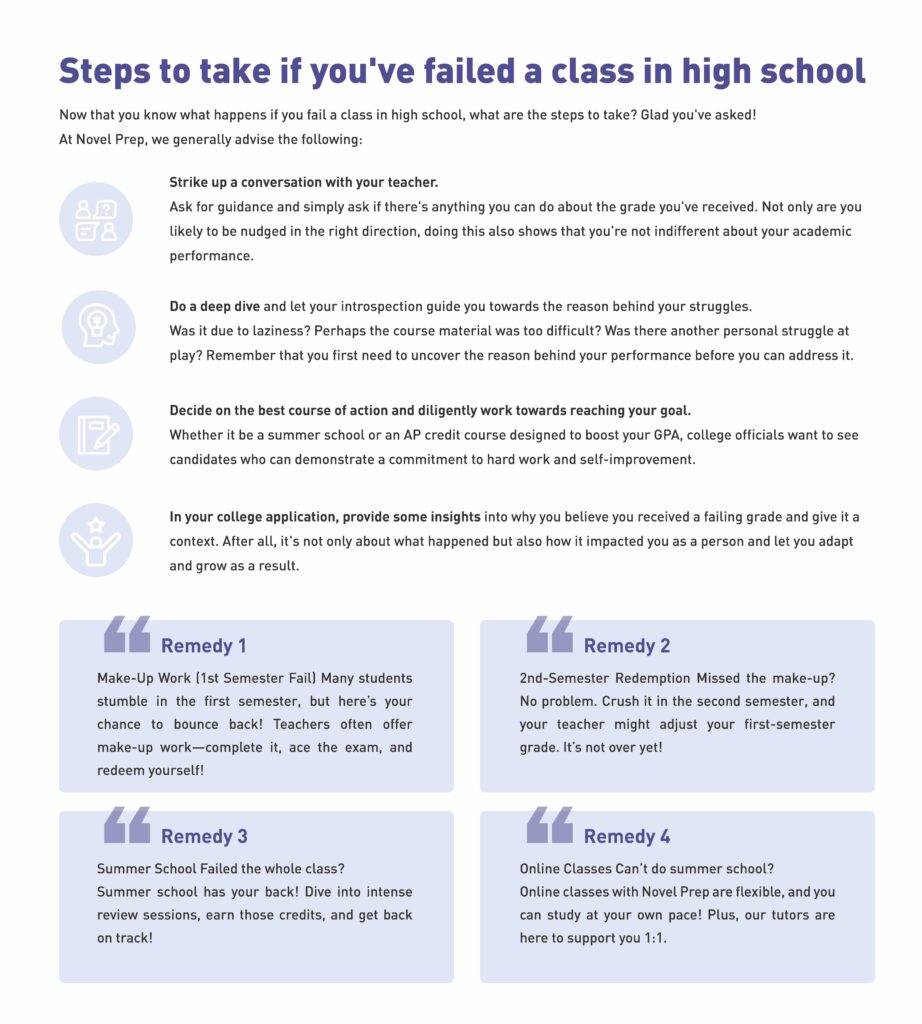There’s no need to emphasize that potentially failing a class is what many high school students’ nightmares are made of. After all, this could very much jeopardize your academic aspirations, and, consequently, your future career opportunities in life. But what happens if you fail a class in high school? Is it all doom and gloom or are there remedies you can apply to salvage the situation?
Turns out there are indeed! However, by far the most reliable strategy is to do your best to not find yourself in such a situation, to begin with. Luckily, we’ll share both the preventative and curative measures, including how to recover credits and get back on track to graduation. Let’s dive right in!
The consequences of failing a class in high school
Yes, failing a class in high school does have certain consequences, despite it not being irreparable. It mostly boils down to:
1. A negative effect on your GPA
As a high school student, it’s in your best interest to keep your GPA as high as possible if you want to better your chances of getting accepted into a reputable college. The fact of the matter is, yes, failing a class in high school will lower your overall GPA, thus worsening your chances of climbing the academic ladder. Although you could still have enough points to get into a college with high acceptance rates, you’re playing a dangerous game if you’re shooting for Ivy League level colleges.
This can be potentially made worse by the fact that certain courses carry a lot more weight in terms of credit, not to mention how GPA generally plays a role in your eligibility to secure a scholarship. If you want to calculate the effect of an F on your overall GPA, the basic formula is simple: an:
- A nets you 4 points;
- a B nets you 3;
- a C nets you 2;
- a D nets you 1;
- and an F is worth 0.
However, it’s not quite as straightforward since we also must factor in the different weights of each class by which the score is multiplied. In other words, scoring an A in a 3-credit hour class would net you 12 points (4 x 3). As you can see, the more hours a class carries, the greater the effect of a failing score. Also, keep in mind that different schools can have different policies as to what happens if you fail a class in high school.
2. Potentially not fulfilling graduation requirements
Failing could potentially be a deal-breaker if it’s a graduation requirement. If this is the case, you’re going to essentially need to retake the class or participate in summer school or a credit recovery program. Typically, earning a certain number of credits is a graduation requirement. Therefore, each successfully completed class brings you one step closer to graduating.
In case you fail, you could try to make up for it by attending a summer school or through one of the remedies we’ve yet to reveal, but you have to realize it takes time, which could effectively postpone your graduation. In other words, the most likely outcome of failing a class is delayed graduation, which in turn could set back the timeline of your entering the labor market.
Know that the situation can be made even worse by failing one of the core classes such as:
- Math
- English
- Science
- Social studies
In most cases, you’re going to need a passing grade in these to progress.
3. Risk having your college application be perceived as less appealing
From what we’ve observed, colleges want to see a strong academic record all throughout your high school years. Fail a class, and it’s going to make for one nasty red flag in their eyes, especially if it’s one of the core subjects mentioned above.
That’s the bad news. The good news is that college officials may be more lenient towards failing a subject that doesn’t align with your chosen major. For instance, failing Math is quite a dealbreaker if you’re studying to be an engineer, but it may not be nearly as much if you’re aiming to become an actor or a musician. In other words, they evaluate the entire picture, and not just isolated events.
One of the things college officials will also take a look at is the year you’ve failed. Failing a class during your freshman year is more likely to be viewed through forgiving eyes due to the fact that transitioning from middle to high school can be quite an unforgiving bump in difficulty. Furthermore, failing a class once doesn’t establish a pattern like failing multiple times does, so don’t beat yourself about it too much.
Bear in mind that college officials tend to look at patterns. For instance, an upward trajectory of your grades improving over time is going to look much better on paper compared to skydiving over the years. So, the takeaway is that a single failure is unlikely to ruin your college application, although it’s certainly not desirable. On the other hand, the complete picture of your high school performance might if it suggest a poor work ethic being an underachiever.
Steps to take if you’ve failed a class in high school
Now that you know what happens if you fail a class in high school, what are the steps to take? Glad you’ve asked! At Novel Prep, we generally advise the following:
- Strike up a conversation with your teacher. Ask for guidance and simply ask if there’s anything you can do about the grade you’ve received. Not only are you likely to be nudged in the right direction, doing this also shows that you’re not indifferent about your academic performance.
- Do a deep dive and let your introspection guide you towards the reason behind your struggles. Was it due to laziness? Perhaps the course material was too difficult? Was there another personal struggle at play? Remember that you first need to uncover the reason behind your performance before you can address it.
- Decide on the best course of action and diligently work towards reaching your goal. Whether it be a summer school or an AP credit course designed to boost your GPA, college officials want to see candidates who can demonstrate a commitment to hard work and self-improvement.
- In your college application, provide some insights into why you believe you received a failing grade and give it a context. After all, it’s not only about what happened but also how it impacted you as a person and let you adapt and grow as a result.

Failing a core high school subject vs. failing an elective
Before we give you some concrete solutions on what to do if you’ve failed a class in high school, there’s an important distinction to understand as the implications may be different. You can fail either:
- Core classes (such as Math, English, Science, and Social studies). A failing grade will be much more of an anchor in this case.
- Elective classes. Despite not having as much weight, we encourage you to re-take them. Keep in mind that these can still be required for you to graduate and may even serve as prerequisites for other classes.
With this out of the way, we can now shift our focus from what happens if you fail a class in high school to what you can actually do about it.
Remedy 1: Make-up work (if you’ve failed the first semester)
At Novel Prep, we’ve noticed a trend that the majority of students who fail a class tend to do so in the first semester. Interesting fact: nearly 2 in 5 Sheboygan high school students failed a class in their first semester. We attribute this to facing something completely new that may, depending on your background, be anything from extremely difficult to impossible to untangle. The effect can easily get compounded by acknowledging the fact that you’re likely to be facing multi-faceted pressure originating from subjects you may be encountering for the very first time.
On the bright side, failing in the first semester means that your teacher will likely give you an opportunity to make up for your ‘past transgressions’ through make-up work. In essence, it’s a series of exercises that you’re going to be asked to complete; after that, you will take an exam to prove you’ve mastered the study material. So if you’ve been given a chance at redemption, this is the best and most efficient path to take – don’t let it slip! After all, the teacher is well within their rights to say ‘no’, so don’t take that opportunity for granted.
Remedy 2: 2nd-semester redemption (if you’ve failed the first semester)
If the first proposed remedy didn’t work, there’s always the second option, known as the ‘2nd-semester redemption’. As the name suggests, it’s an opportunity to be focused and work super hard during the 2nd semester in an effort to raise your grade. Depending on your agreement, the teacher might be willing to change your grade.
After all, your first semester is supposed to be a lesson, not a life sentence. Depending on your personality, the opportunity to redeem yourself may fuel your desire it give it all you’ve got, or it could manifest itself as additional stress due to fear of failing one more time. In certain cases, flexing your academic muscles and studying overtime requires some extra support in the form of working on your mindset, which should be that of resilience and perseverance.
Remedy 3: Summer school (if you’ve failed the whole class)
So, you’ve failed the entire class. While certainly not pleasant, your academic fate is not written in stone quite yet! You still have the option of signing up for summer school. During this time, you will go through rigorous exercises and worksheets designed to help you master the subject material in the short time frame you’ve been given.
However, if you simply trust the process and keep showing up day after day, significant progress can be made. At Novel Prep, there’s one thing we always keep saying – don’t be afraid to raise your hand and let your teacher know if the pace is too fast. That way, you’ll be able to stay on track and not risk falling behind. If all goes well, you’ll be way on your way to earning the missing credits and graduating on time.
Note that, depending on where you live, summer school might not be available at all. But don’t despair! There is another way.
Remedy 4: Tutoring or online classes (suitable for everyone)
If you live in a remote location and can’t access your school’s physical location without a great deal of effort on your part, there is an alternative – online classes! These also happen to be a great fit for those whose schedule is already packed full of other responsibilities.
At Novel Prep, we’re authorized to bring you a US High School Diploma Program! These are credit courses that count for any US college of your choosing. This is a fantastic opportunity to:
- Get back on track to earning the credits you’re missing in various subjects
- Study from the comfort of your home
- Work at your own pace
- Get support and guidance from our tutors
- Enjoy the flexibility that accommodates any schedule
- Increase your GPA
- Participate in courses not available at your school
- and more!
Above all else, taking our online classes gives you access to Novel Prep tutors who know exactly what the most important things to study are, essentially saving you hours upon hours of time and expediting your academic journey. You can count on personalized one-on-one support to get you through to where you want to be.
How to make sure you never fail a high school class ever again
Before we conclude, if you’ve ever had the misfortune of experiencing how it feels to fail a high school class, it’s on you to make sure it never happens again. Although there’s no way to guarantee it, you can drastically lower the chances of it happening by committing to the following:
- Get to the bottom of what caused you to fail. If you believe it was the teacher’s fault, try to be objective and honestly ask yourself if perhaps there’s something you’ve done to contribute.
- Don’t be lazy. Achieving anything in life rarely comes easy, and academic progress is no different. Some may have a natural talent and therefore, an advantage in certain areas, but no one gets to escape hard work.
- Work with your teacher. Raise your hand and ask if you need further clarification and ask them for advice on how to better organize your notes, etc.
- Work with a tutor. For obvious reasons, this isn’t going to be free, but if your family has the financial means to support your academic growth, it’s definitely worth every penny.
- Keep showing up for classes day in and day out. As the old saying goes, practice makes perfect!
- Finish your homework on time. Trying to cram everything in the last possible moment almost never works.
- Ask your peers for help. It will help you stay on track and clarify problems as they arise.
- Manage your time like a pro. Try to maximize every single minute spent on a task. In addition, consider cutting things out from your schedule that don’t matter. See if modern-day productivity apps make it easier for you.
- Develop a studying habit. Much like it’s second nature for you to brush your teeth, you should not pump too much active thought into picking up the textbooks.
Conclusion
So what happens if you fail a class in high school? Nothing yet – at least not if you take the opportunity to learn from your mistakes and take the steps needed to remedy the situation. Fail to act, however, and you could delay your graduation and even leave a giant black mark on your college application. So do what you can by taking the steps we’ve outlined today and take action! You don’t have to do this alone – get in touch with our tutors and let’s see if we can help you fast-track your way to academic redemption.



